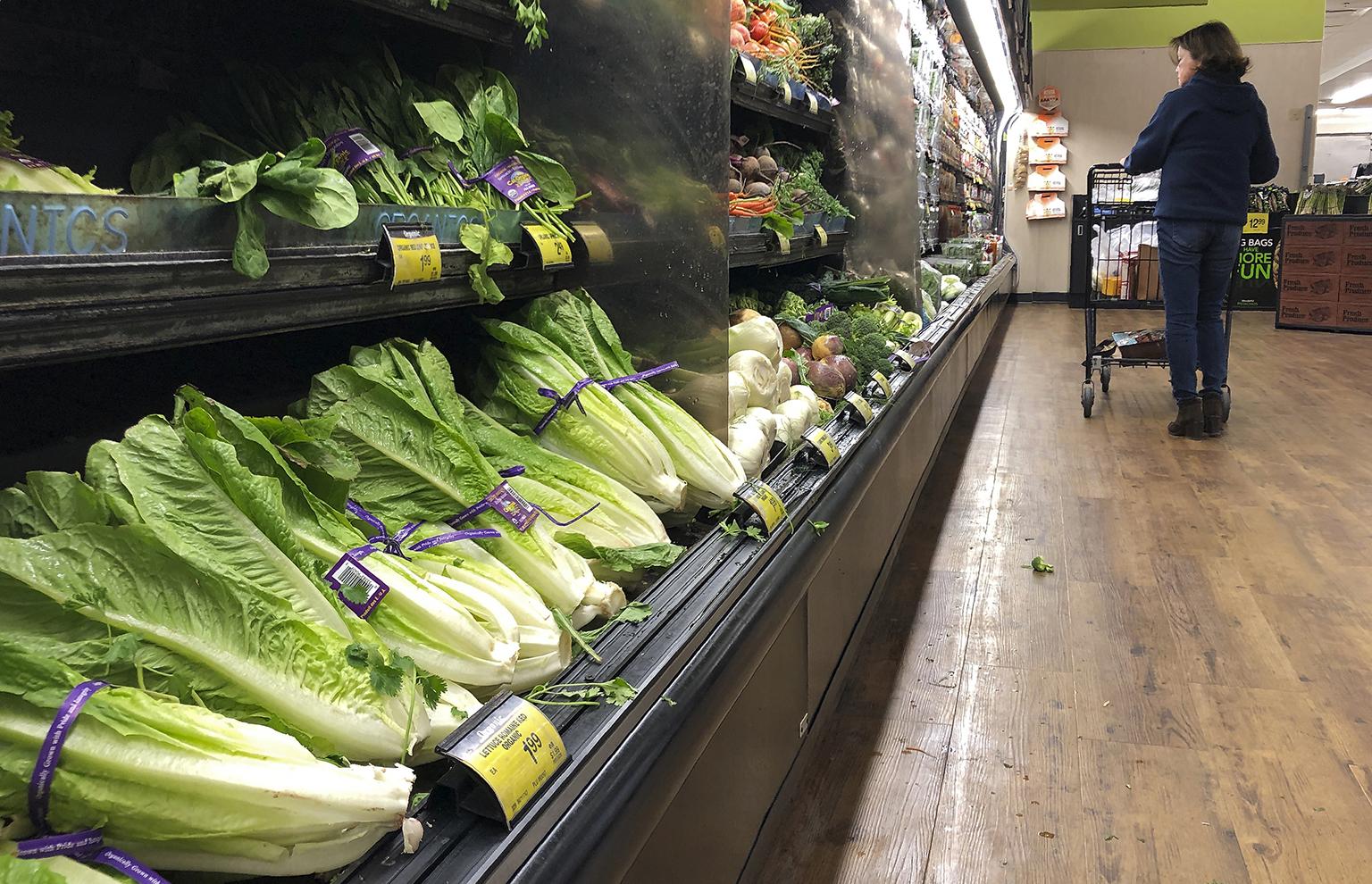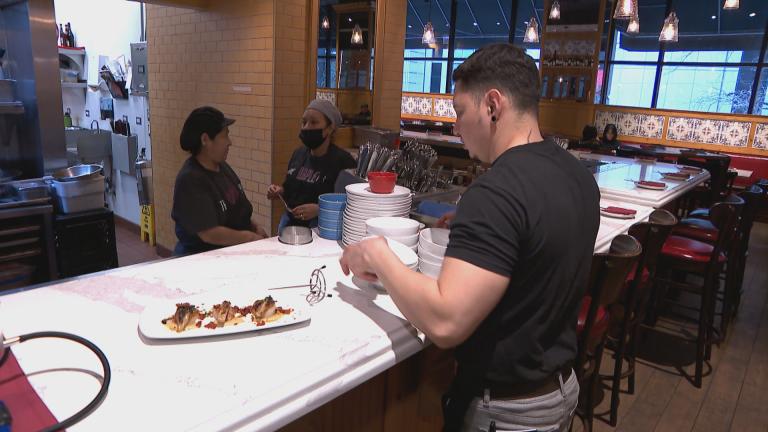 Romaine lettuce still sits on the shelves as a shopper walks through the produce area of an Albertsons market Tuesday, Nov. 20, 2018, in Simi Valley, Calif. Health officials in the U.S. and Canada told people Tuesday to stop eating romaine lettuce because of a new E. coli outbreak. (Mark J. Terrill / AP Photo)
Romaine lettuce still sits on the shelves as a shopper walks through the produce area of an Albertsons market Tuesday, Nov. 20, 2018, in Simi Valley, Calif. Health officials in the U.S. and Canada told people Tuesday to stop eating romaine lettuce because of a new E. coli outbreak. (Mark J. Terrill / AP Photo)
NEW YORK (AP) — Health officials in the U.S. and Canada told people Tuesday to stop eating romaine lettuce because of a new E. coli outbreak.
The U.S. Food and Drug Administration said it is working with officials in Canada on the outbreak, which has sickened 32 people in 11 states and 18 people in the Canadian provinces of Ontario and Quebec. Two individuals in Illinois have tested positive for this same outbreak strain of E. coli, according to the Illinois Department of Public Health.
The strain identified is different than the one linked to romaine earlier this year but appears similar to last year's outbreak linked to leafy greens.
FDA Commissioner Scott Gottlieb said the agency doesn't have enough information to ask suppliers for a recall, but he suggested that supermarkets and restaurants should withdraw romaine until the source of the contamination can be identified.
People are also being advised to throw out any romaine they have at home, including whole heads of romaine and hearts of romaine. Officials are also advising consumers to throw out any bags and boxes of precut lettuce and salad mixes that contain romaine, including baby romaine, spring mix and Caesar salad. “If you do not know if the lettuce is romaine or whether a salad mix contains romaine, do not eat it and throw it away,” IDPH said in a statement.
The contaminated lettuce is likely still on the market, Gottlieb told The Associated Press in a phone interview.
He said FDA wanted to issue a warning before people gathered for Thanksgiving meals, where the potential for exposure could increase.
"We did feel some pressure to draw conclusions as quickly as we could," he said.
In Canada, officials issued similar warnings to the two provinces where people were sickened. They said there was no evidence to suggest people in other parts of the country had been affected.
Most romaine sold this time of year is grown in California, Gottlieb said. The romaine lettuce linked to the E. coli outbreak earlier this year was from Yuma, Arizona. Tainted irrigation water appeared to be the source of that outbreak, which sickened about 200 people and killed five.
The FDA's blanket warning in the current outbreak is broader and more direct than the ones issued in the earlier outbreak, said Robert Whitaker, chief science officer for the Produce Marketing Association. In the earlier outbreak, the warnings about romaine from Yuma might have been confusing, he said.
Whitaker said the industry group told members they should cooperate with the FDA and stop supplying romaine lettuce, especially since people have been told to stop buying and eating it.
No deaths have been reported in the current outbreak, but 13 people in the U.S. and six in Canada have been hospitalized. The last reported U.S. illness was on Oct. 31, while and the most recent illness in Canada was early this month.
Tracing the source of contaminated lettuce can be difficult because it's often repackaged by middlemen, said Sarah Sorscher, deputy director of regulatory affairs at the Center for Science in the Public Interest. That can mean the entire industry becomes implicated in outbreaks, even if not all products are contaminated.
"One of the problems with produce is that it can be very hard to trace back," she said.
She said washing contaminated lettuce won't ensure that harmful germs are killed.
Most people who are infected will begin feeling sick within three to four days after consuming products that contain the bacteria, but illness can start anywhere from one to 10 days after exposure, according to IDPH.
Infections from E. coli can cause symptoms including severe stomach cramps, diarrhea and vomiting. Most people recover within a week, but some illnesses can last longer and be more severe. “Contact your health care provider if you have diarrhea that lasts for more than three days or is accompanied by fever, blood in the stool, or so much vomiting that you cannot keep liquids down and you pass very little urine,” IDPH said in a statement.
Health officials have also been reminding people to properly handle and cook their Thanksgiving birds amid a widespread salmonella outbreak linked to raw turkey. Last week, Hormel recalled some packages of Jennie-O ground turkey that regulators were able to tie to an illness.
But unlike with romaine lettuce, regulators are not warning people to avoid turkey. Salmonella is not prohibited in raw meat and poultry, and the U.S. Department of Agriculture, which overseas raw meat, said cooking should kill any salmonella.
Contact Kristen Thometz: @kristenthometz | [email protected] | (773) 509-5452
Related stories
Report: Slime, Other Popular Toys Pose Threats to Children
Cases of Foodborne Illness in Illinois Surpass 500
Cook County Officials Report Measles Exposure in City, Suburbs








